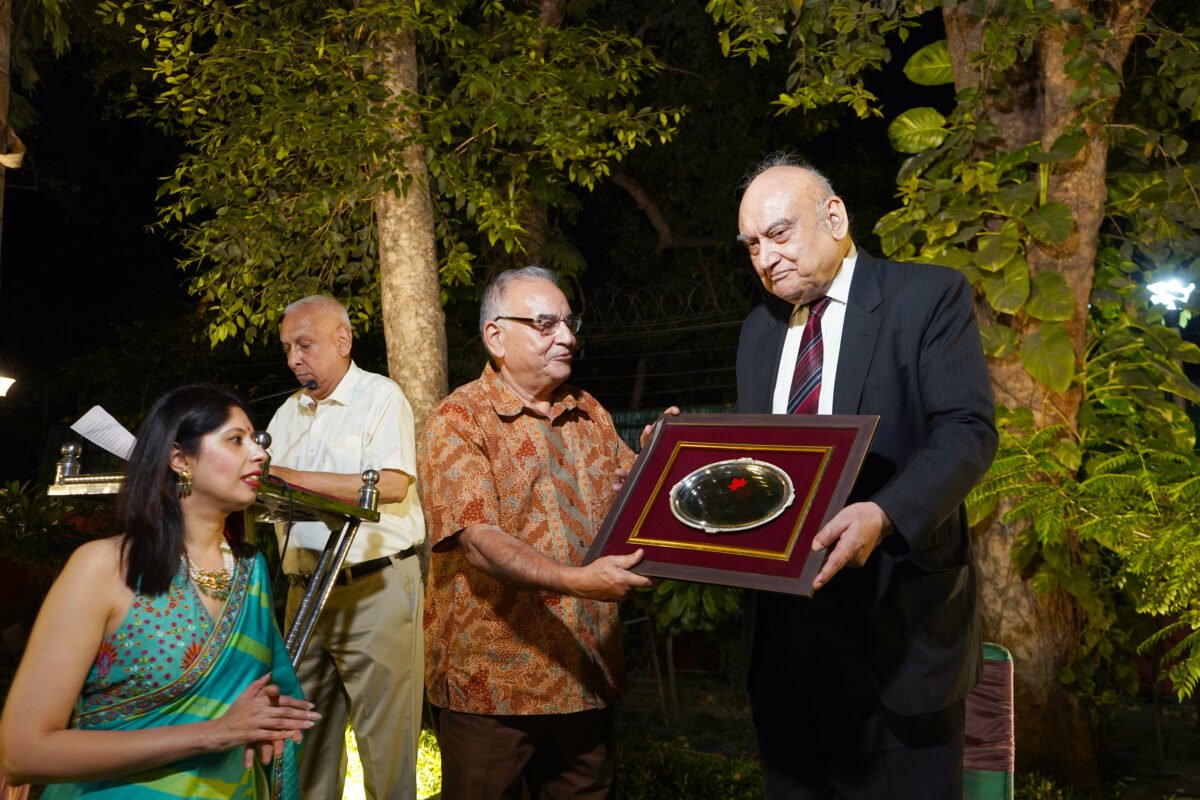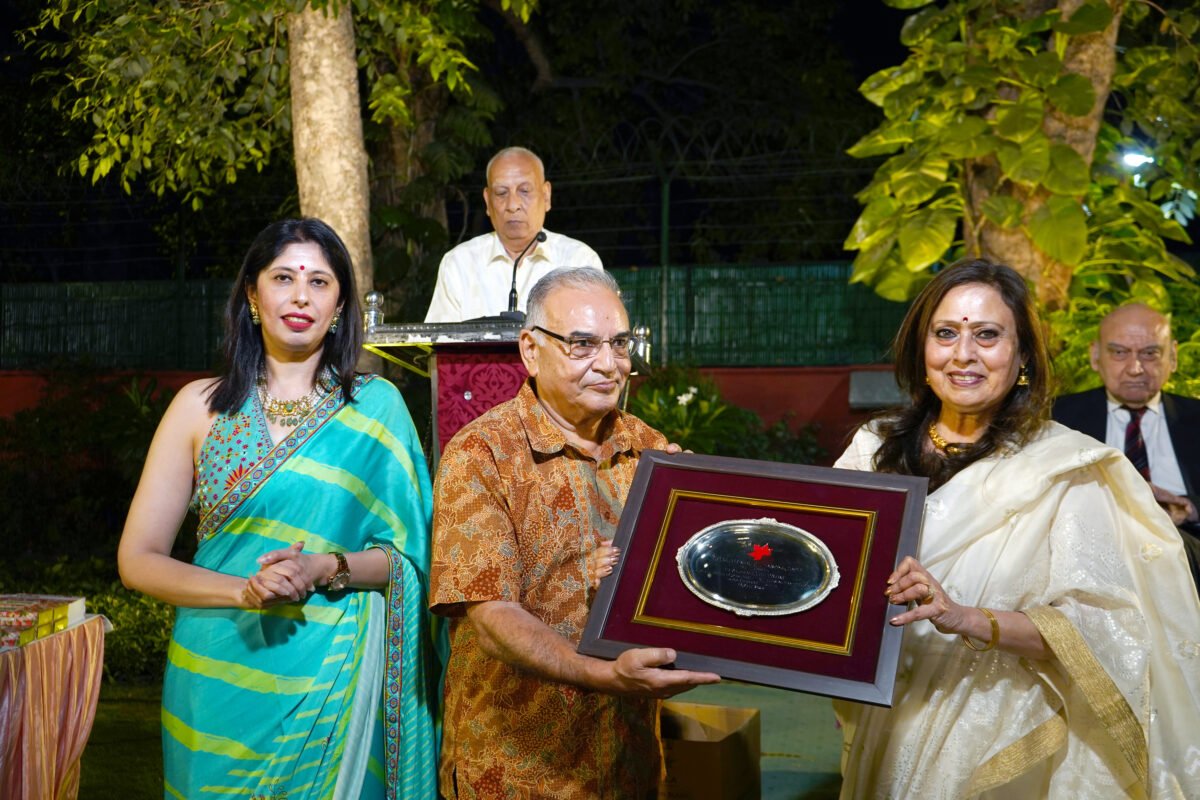JKSSB ADMIT CARDS RELEASED FOR JKP CONSTABLE EXAM DOWNLOAD NOW DIRECT LINK HERE
CLICK ON THE BELOW LINK TO DOWNLOAD UR ADMIT CARD
CLICK HERE TO DOWNLOAD UR ADMIT CARD
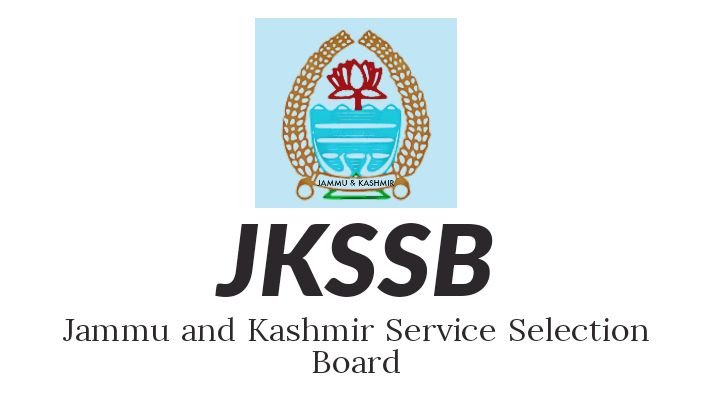
CLICK ON THE BELOW LINK TO DOWNLOAD UR ADMIT CARD
CLICK HERE TO DOWNLOAD UR ADMIT CARD
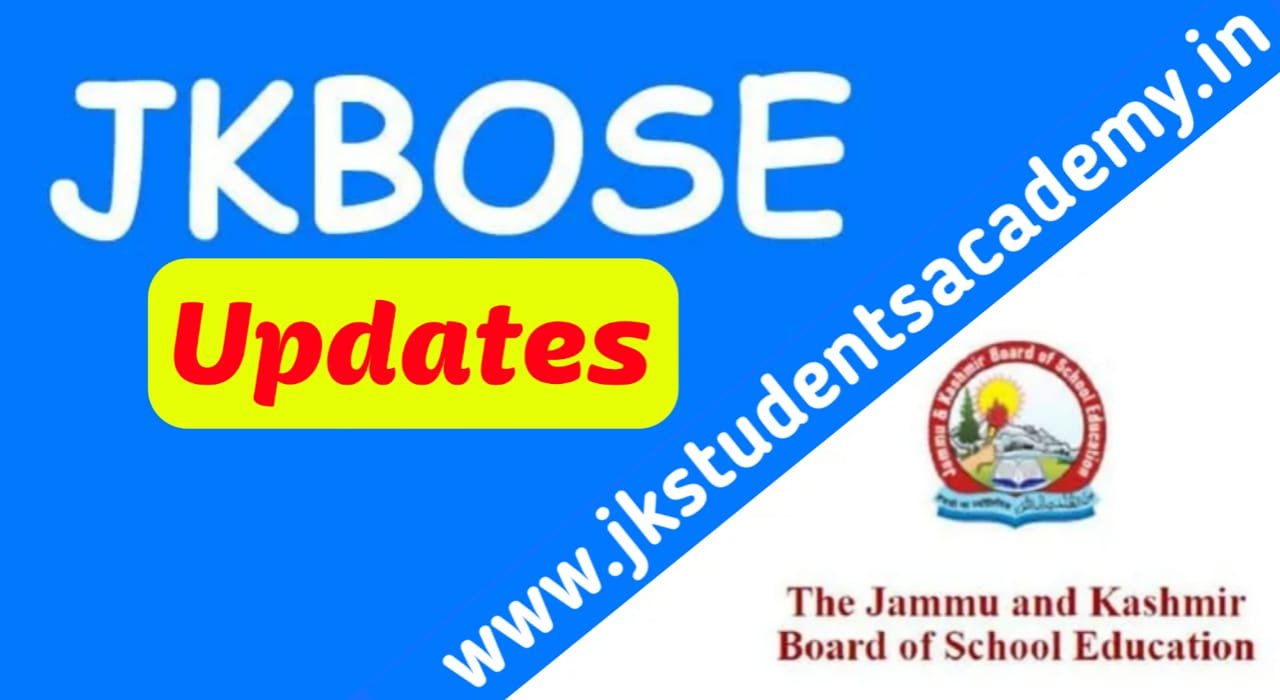
DIET KASHMIR DATESHEET RELEASED FOR CLASS 1ST TO 9 TH
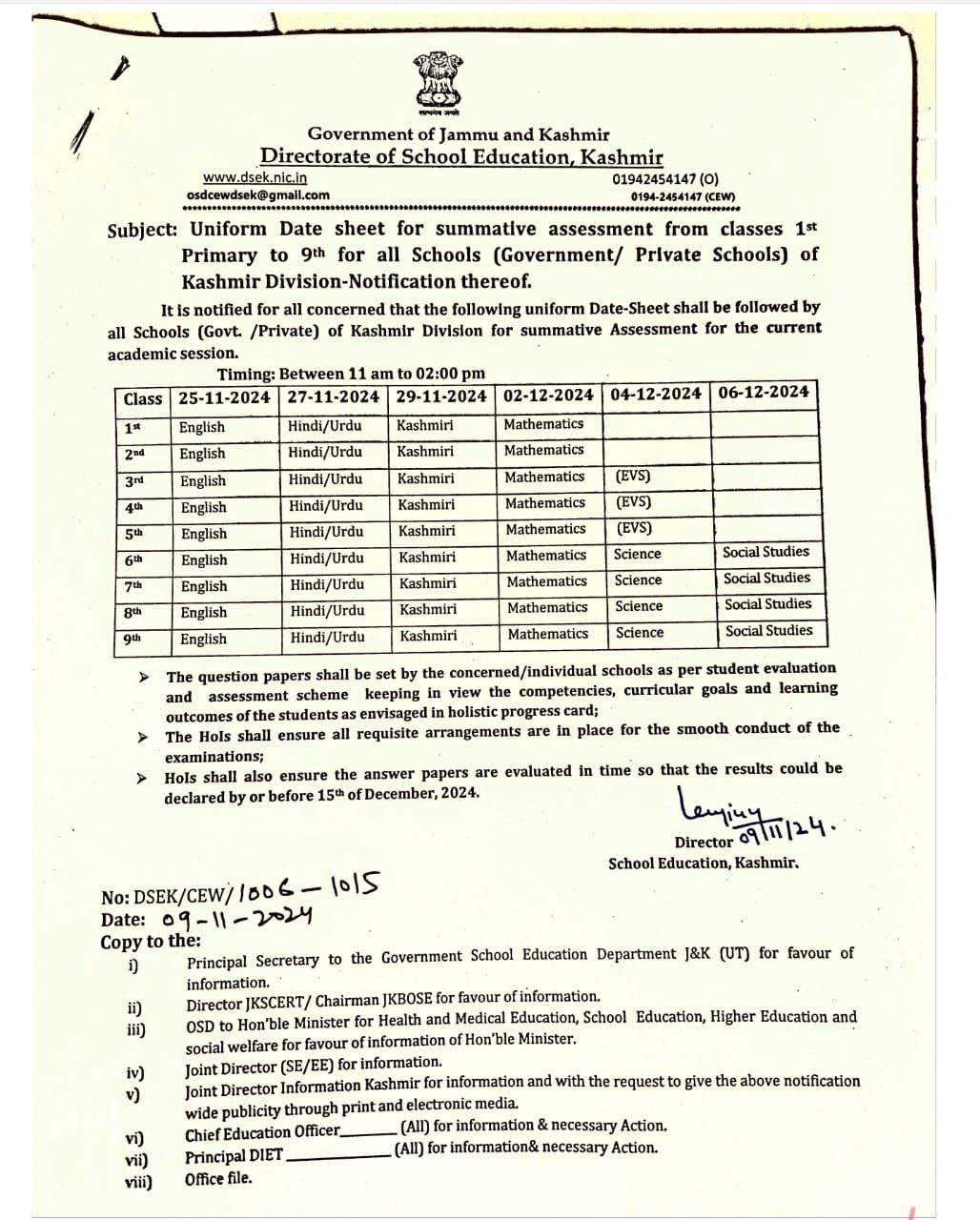
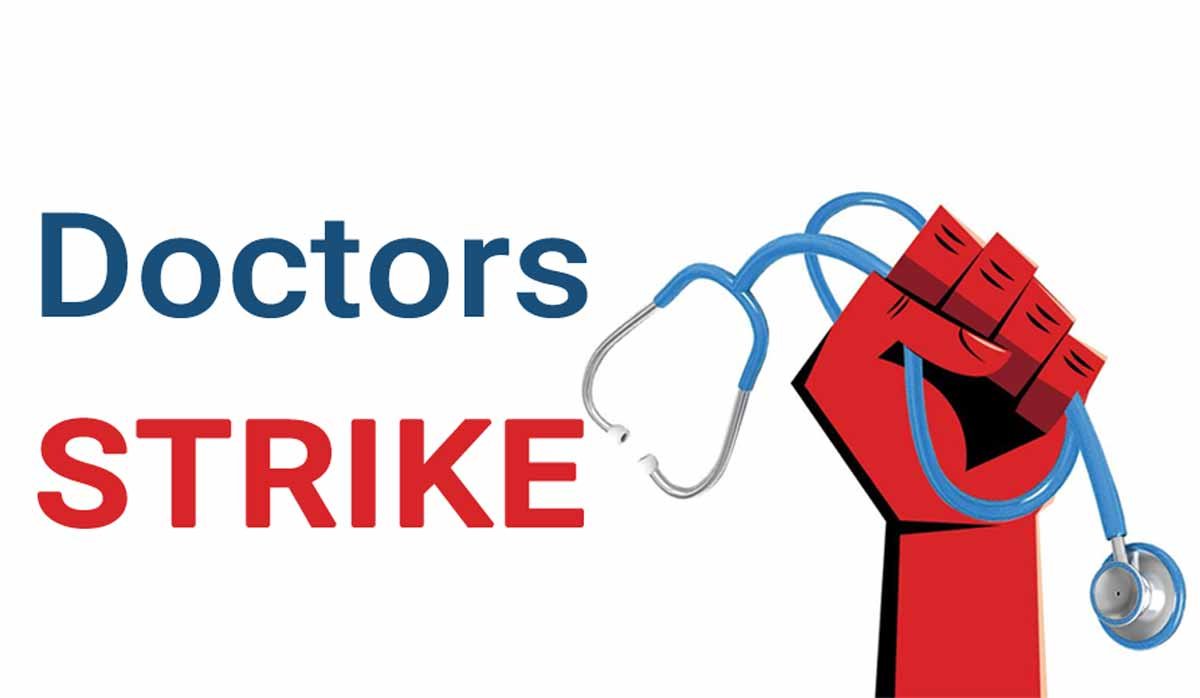
Jammu, August 15, 2024 — The Resident Doctors’ Association (RDA) of Acharya Shri Chander College of Medical Sciences (ASCOMS) and Hospital, Jammu, has issued a press release expressing their deep concern and outrage over the recent tragic incident at R.G. Kar Medical College and Hospital, Kolkata. On August 9, 2024, a second-year female postgraduate resident in chest medicine was brutally sexually assaulted and murdered in the hospital’s seminar hall, a crime that has shocked the entire medical community across India.
In response to this horrific event, medical professionals across the nation have initiated protests demanding justice and stronger security measures for healthcare workers. Joining this nationwide movement, the RDA at ASCOMS, along with interns, undergraduate students, and nursing staff, has declared their full support and participation in the protests.
In a press release, the RDA stated, “This crime should awaken the human inside us and should move our souls to join this movement. We implore everybody to join us.” They extended their deepest condolences to the victim’s family, friends, and fellow residents, emphasizing the need for immediate and unbiased investigation and action.
The RDA has put forth several demands, including:
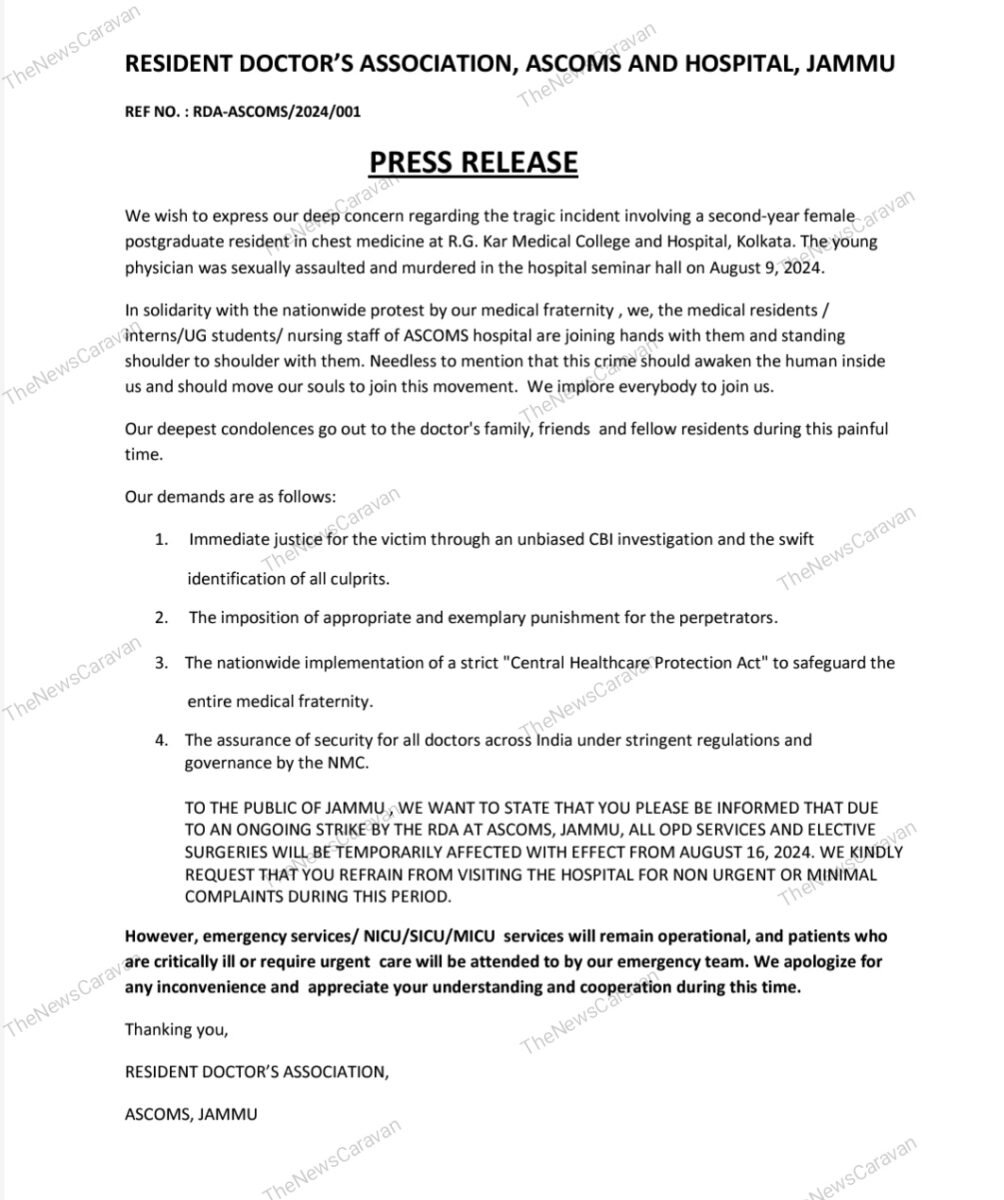
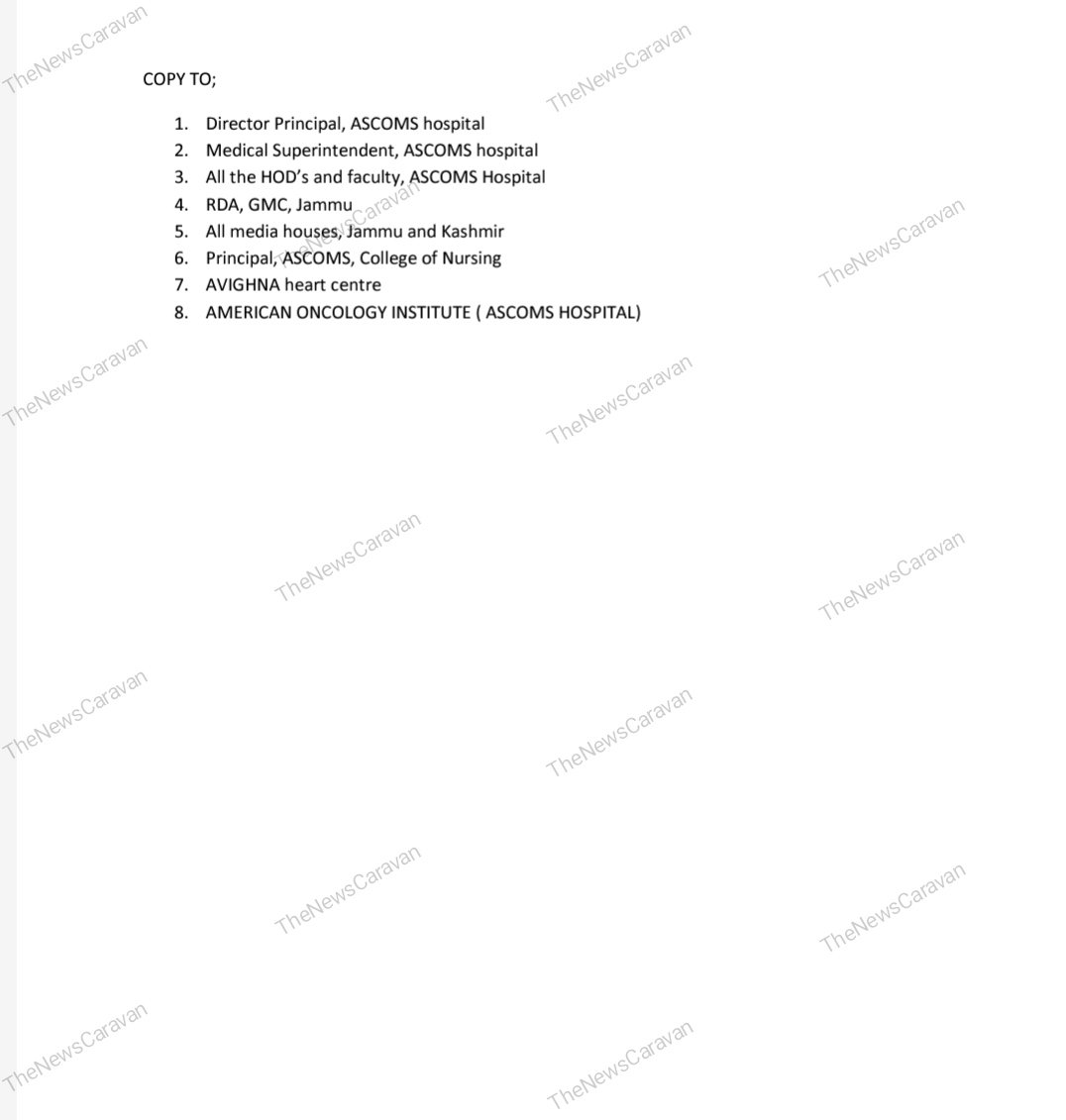
Impact on Hospital Services
In light of their participation in the protest, the RDA has announced that all Outpatient Department (OPD) services and elective surgeries at ASCOMS Hospital, Jammu, will be temporarily suspended starting August 16, 2024. The association has urged the public to refrain from visiting the hospital for non-urgent or minimal complaints during this period.
However, the RDA has assured that emergency services, including NICU, SICU, and MICU, will remain fully operational. Patients in critical condition or requiring urgent care will be attended to by the hospital’s emergency team.
The Resident Doctors’ Association expressed their regret for any inconvenience this strike may cause to the public and thanked the community for their understanding and cooperation during this difficult time.
Public and Institutional Response
The RDA’s press release was copied to the Director Principal and Medical Superintendent of ASCOMS Hospital, all Heads of Departments, the Resident Doctors’ Association at GMC Jammu, media houses across Jammu and Kashmir, and other affiliated medical centers.
The strike at ASCOMS is part of a broader movement within the medical fraternity, demanding safety, justice, and better working conditions for healthcare professionals nationwide. The public is urged to stay informed and support the ongoing struggle for a safer and more just healthcare system in India.
For further updates, please stay tuned to The News Caravan
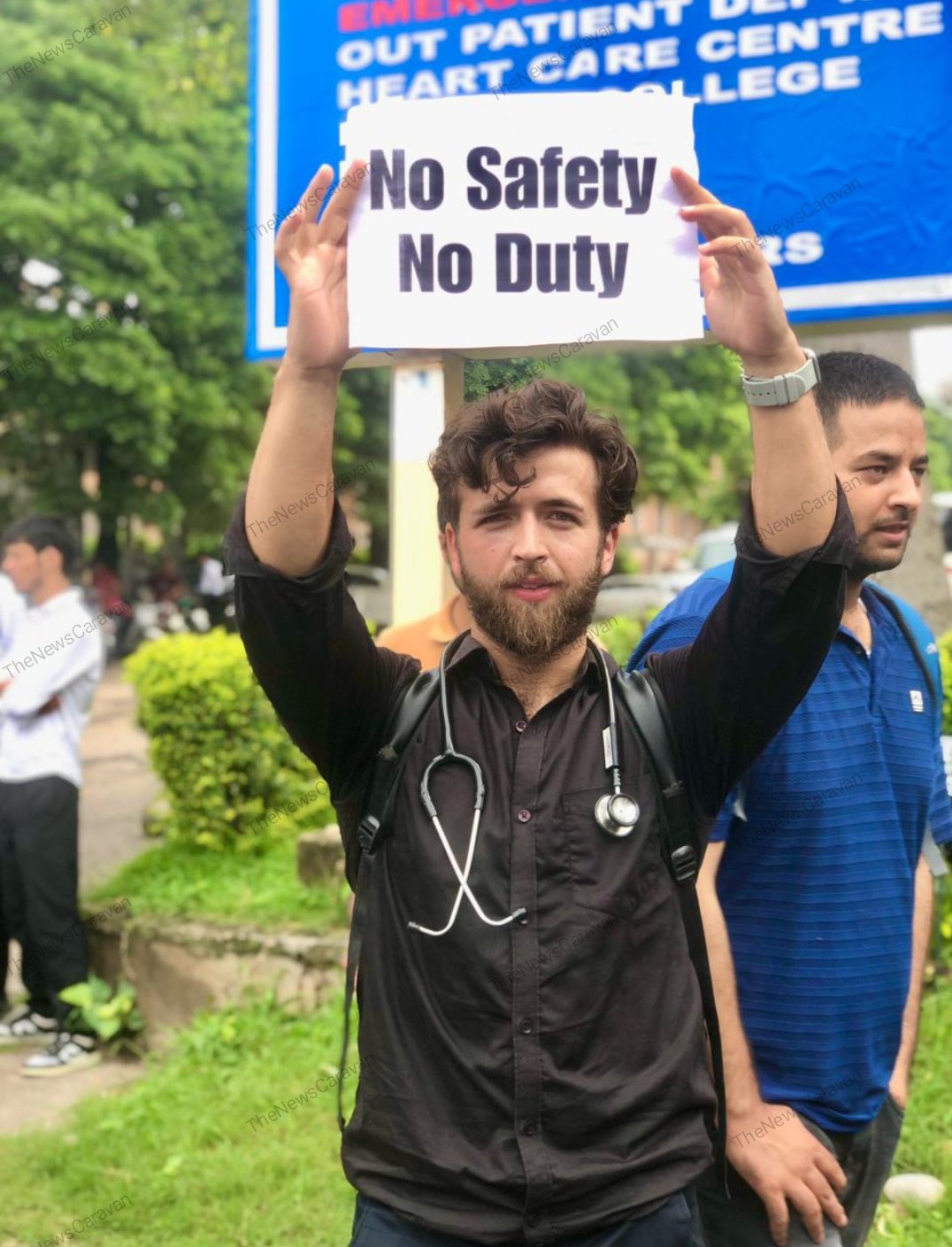
Jammu, India – The tragic rape and murder of a 31-year-old juniors doctor at Kolkata’s RG Kar Medical College and Hospital has ignited widespread outrage, with doctors from the Acharya Shri Chander College of Medical Sciences (ASCOMS) in Jammu emerging at the forefront of protests. These protests are a call to action for stronger safety measures and protections for medical professionals who are increasingly finding themselves vulnerable to violence and threats in the workplace.
The horrifying incident in Kolkata has sent shockwaves through the medical community. The trainee doctor, who was both a promising medical professional and a dedicated caregiver, was brutally attacked within the hospital premises—an environment that should be a sanctuary for both patients and staff. This crime has brought to light the urgent need for comprehensive safety protocols within healthcare institutions, highlighting a growing crisis that doctors and healthcare workers have been facing for years.
Protests Across the Medical Community
In the days following the tragedy, doctors and medical students across India have taken to the streets, expressing their anger and fear. The protests have been especially pronounced in Jammu, where doctors from ASCOMS have led the charge.
In a symbolic and powerful statement, a doctor from ASCOMS was seen holding a placard that read “No Safety, No Duty,” encapsulating the sentiment shared by healthcare workers nationwide.
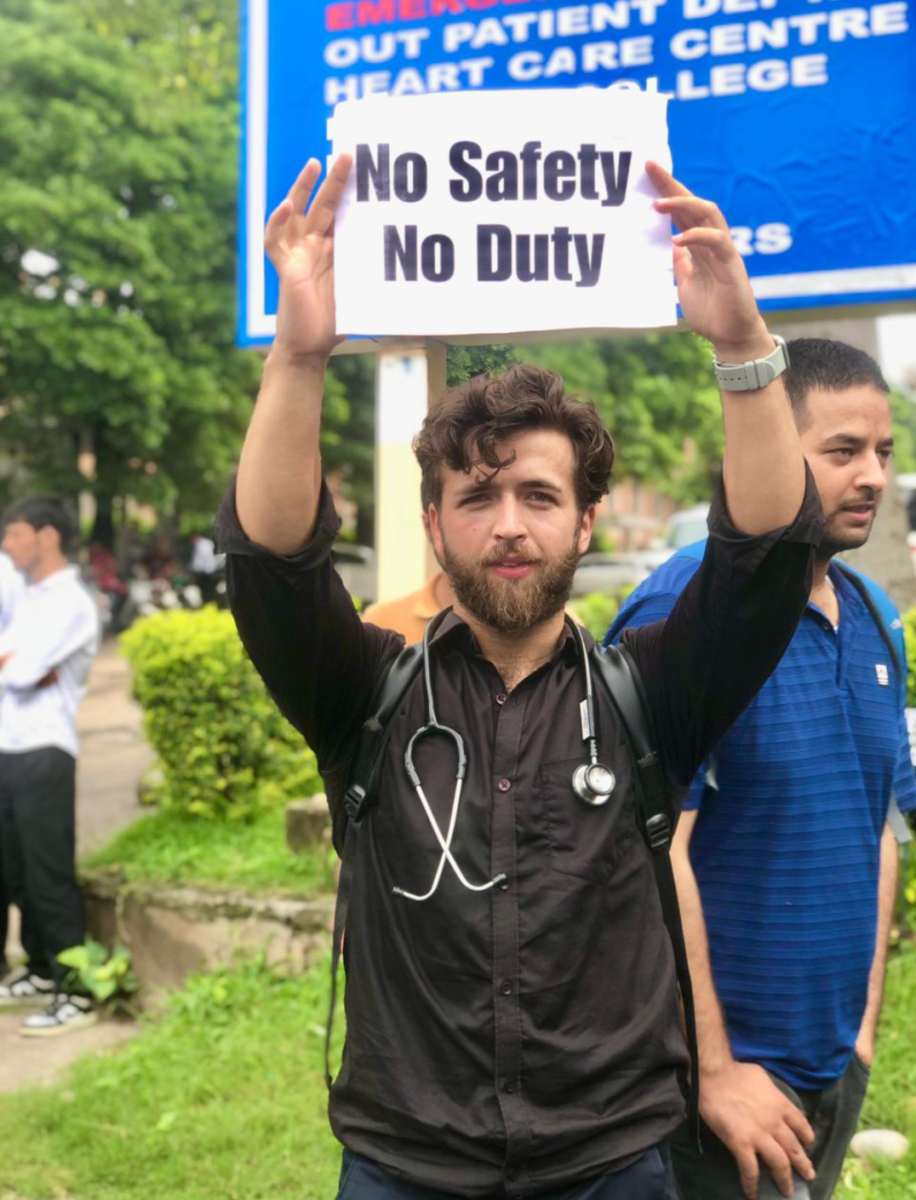
Another doctor was seen holding a placard that read ” Saving Lives, Risking Ours !? – The Unprotected Doc’s “
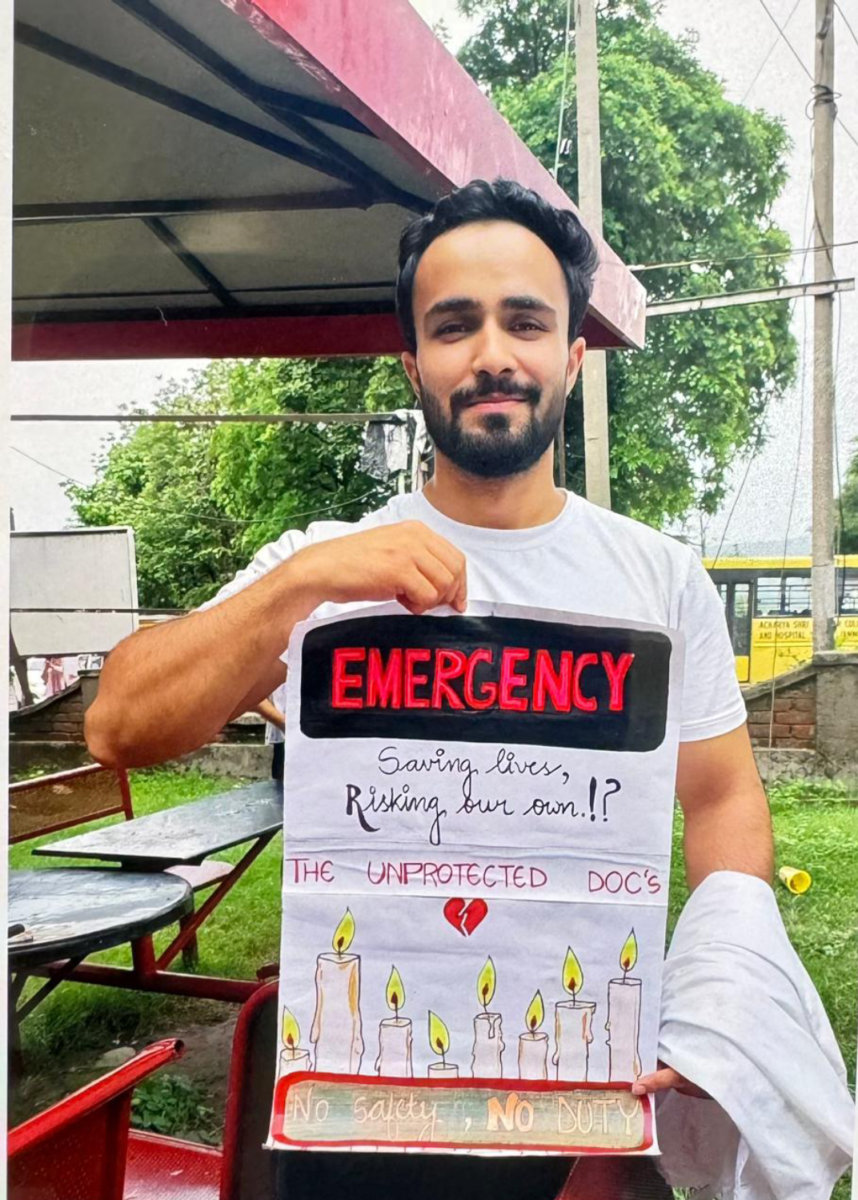
Videos from the protest site:
These protests are not just about demanding justice for the slain trainee doctor but also about pushing for systemic change. The medical fraternity is calling for the implementation of a central law to protect healthcare workers from violence and assault, a measure that they believe is long overdue. The demands include not only physical safety but also ensuring that hospitals are equipped with the necessary resources to prevent such incidents from happening in the future.
Calls for Accountability
The case has also brought about significant legal and administrative consequences. The Calcutta High Court has heavily criticized the administration of RG Kar Medical College for its “serious lapses” in the matter, leading to the resignation of Sandip Ghosh, the principal of the college. However, his immediate reassignment to another prominent medical institution—Calcutta National Medical College—sparked further protests, ultimately resulting in the court placing him on indefinite leave.
The involvement of the Central Bureau of Investigation (CBI) adds another layer of seriousness to the case, as the central agency steps in to ensure a thorough and unbiased investigation. The focus remains on bringing those responsible to justice and addressing the broader issues of safety and security for medical professionals.
A Cry for Change
The protests led by ASCOMS doctors, alongside their peers from institutions like AIIMS and various medical associations, are a clarion call for change. They underscore the growing unrest within the medical community, which feels increasingly under siege. The message from these healthcare workers is clear: without adequate safety measures, their ability to perform their duties is severely compromised.
As the protests continue to gain momentum, the medical community is rallying together to ensure that the voices of those on the front lines are heard. The tragic incident in Kolkata has become a catalyst for a broader movement aimed at securing the rights and safety of medical professionals across the country.
The medical fraternity’s demand for action is not just a plea for justice for the victim but a push for a future where healthcare workers can perform their duties without fear, ensuring that such a tragedy never occurs again.
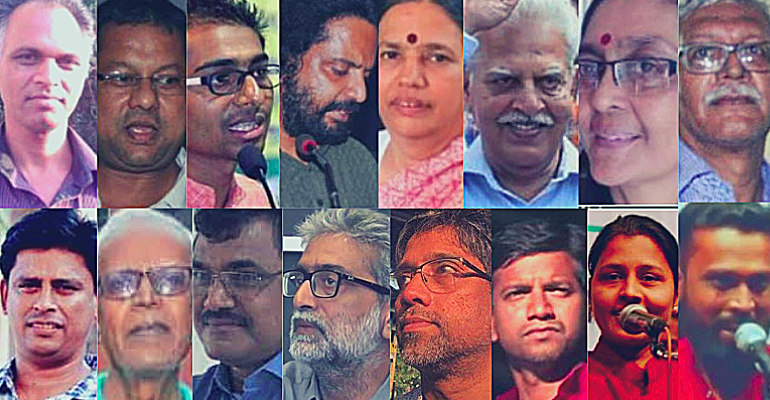
To my Brothers and Sisters Judges of the Supreme Court of India
I respectfully appeal to you to revisit the cases of the people in jail mentioned below whom I believe are innocent and have been wrongly incarcerated due to political vendetta by the Modi Government, quash the bogus charges against them, and free them.
They should be freed forthwith
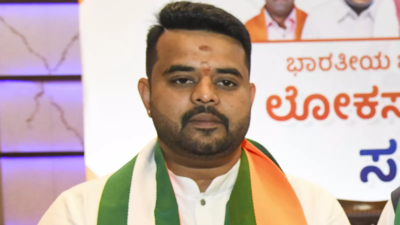
A sex scandal has erupted in India which is flying all around the country–in headliners of many newspapers, on TV, on the social media, and is being discussed.

Briefly, the scandal relates to Prajwal Revanna, the 33 year old grandson of HD Deve Gowda, a 91 year old former Indian Prime Minister and leader of the JDS ( Janta Dal Secular ), a regional political party in the State of Karnataka, which is presently in alliance with the BJP. Prajwal’s father HD Revanna is a member of the Karnataka Legislative Assembly and former Minister. His uncle HD Kumarswamy is a former Chief Minister of the state.
Also Read: Modi, in the name of God, Go
Prajwal is presently a sitting member of the Lok Sabha ( the lower house of the Indian parliament ), and he is again contesting in the ongoing Lok Sabha elections from his family’s home seat of Hassan.
The election in Hassan was held on 26th April. A few days before the election, a large number of identical pen drives were thrown overnight by unknown persons all over Hassan– in bus stations, railway stations, bazaars, tea stalls, streets, garbage dumps, homes of people, etc.
These pen drives contain 2976 videos showing Prajwal sexually assaulting hundreds of women, including panchayat members, police women, government employees, housewives, etc. Many of these videos are disgusting, lecherous and obscene. Women can be seen tearfully pleading to be let go, but none dared to report it to the police for fear of their lives ( as Prajwal’s family was very rich and powerful ) or for fear of dishonour. The background in many of these videos is a store room in Prajwal’s house, and his clothes which he often wears can be seen.
Also Read: MBBS Interns in J&K Demand Stipend Hike
It seems Prajwal himself recorded many of these videos, while some were recorded by an assistant.
The Chairperson of the Karnataka State Commission for Women has called it the greatest sex scandal in India.
Despite widespread circulation of these videos a few days before the election on 26th April, Prajwal went around brazenly campaigning and asking for votes till the 25th April, but he disappeared thereafter, and he is reported to have fled to Germany.
Subsequently, a maid of Prajwal gathered courage and filed an FIR ( first information report ) before the police. She had been repeatedly raped by Prajwal, but being poor and helpless remained silent about it, but when Prajwal tried to sexually assault her daughter too this was too much for her to bear.
Thereafter more women came forward and filed FIRs. A former member of a panchayat alleged that she was offered several allurements by Prajwal to have sex with him, but when she refused, he threatened to shoot her. He raped her repeatedly for 3 years. Other women complained of blackmail by Prajwal, who threatened to leak their pictures in lewd state unless they surrendered to his demands. Daily new allegations are coming in in this connection.
One woman complained to Prajwal’s father HD Revanna about Prajwal’s misdeeds, but instead of reprimanding his son he too allegedly sexually assaulted her.
Who distributed these pen drives ( which can be seen on the social media ) ? The most common belief is that it was Prajwal’s estranged ex driver Kartik, while some attribute it to a political rival G Devraj Gowda, a member of the BJP.
A SIT ( special investigation team ) has been set up by the Karnataka Government to investigate the scandal.
Apart from the specific facts of the case, the more significant thing is that it shows how politicians in India can get away with the most horrendous and outrageous crimes with impunity. Now many people are saying that Prajwal’s lascivious, lustful, and perverted nature was widely known in Hassan, but no one dared to speak publicly about it for fear of his family’s retribution. Had it not been for the revelation by the pen drive, he too may have got away with it.
G Devraj Gowda, to whom Kartik allegedly gave the pen drive, said he wrote to the BJP higher ups in Bangalore and Delhi about it, but they remained mum. This reflects adversely on the BJP which had waxed eloquent on their theme ‘beti bachao, beti padhao‘, but Prime Minister Modi was often seen in videos with Prajwal and his entire family, and canvassed for him
This incident, and the recent Electoral Bonds scam, have removed the last fig leaf from the body of Indian politics

Jammu & Kashmir, April 15, 2024 – The disparity in stipends received by MBBS interns across different states has once again come under the spotlight, as MBBS interns in Jammu & Kashmir continue to voice their dissatisfaction with the meager stipend of ₹12,300 they receive. This issue has sparked a social media campaign under the hashtag #HikeJKInternsStipend, highlighting the stark difference between the stipends of MBBS interns in J&K compared to those in other states, which range from ₹20,000 to ₹30,000 with Assam ranking the highest with a stipend of ₹31,500.

Despite recommendations for an increase in stipends, the situation remains unchanged, prompting interns to raise their concerns directly to authorities, including the Office of the Lieutenant Governor of J&K, @OfficeOfLGJandK, and other prominent figures in the state’s healthcare sector.
Interns play a crucial role in the functioning of hospitals, often working long hours and providing essential care to patients. They are the backbone of the healthcare system, yet their efforts seem undervalued and overlooked when it comes to compensation.
“The current stipend of ₹12,000 is insufficient to support oneself, let alone a family,” says one medical intern who preferred to remain anonymous. “We work tirelessly, often in challenging conditions, and deserve to be fairly compensated for our contributions.”
The disparity in stipends not only affects the financial well-being of interns but also raises concerns about retention and morale within the healthcare workforce. Many interns in J&K face the dilemma of balancing their professional responsibilities with their personal financial obligations, leading to added stress and strain.
In response to the growing outcry, medical interns are calling for a revision in stipend policies to reflect the true value of their work and to ensure parity with their counterparts in other states. They urge authorities to recognize their dedication and commitment by providing them with a livable wage that acknowledges the demanding nature of their roles.
As the debate continues, interns in Jammu & Kashmir remain hopeful that their voices will be heard, and meaningful action will be taken to address their concerns. They emphasize that fair compensation is not just a matter of financial security but also a reflection of the value placed on their contributions to the healthcare system.
Efforts to reach out to relevant authorities, including @SyedAbidShah, @HealthMedicalE1, @DullooAtal, @manojsinha_, @DrJitendraSingh, @RavinderRaina, @Junaid_Mattu, @IltijaMufti_, @MehboobaMufti, @OmarAbdullah, and @sajadlone, for comments on the matter were unsuccessful at the time of reporting.
Iltija Mufti’s tweet regarding this issue:
The plight of MBBS interns in Jammu & Kashmir serves as a reminder of the challenges faced by healthcare workers across the country and the importance of fair compensation in ensuring a sustainable and effective healthcare system.

In 2015 a Muslim Mohd Ikhlaq was lynched in a village near Dadri, Gautam Buddhanagar district, UP by a mob for allegedly eating beef.

In this connection a panel discussion was organised by the well known TV journalist Barkha Dutt on NDTV channel, to which I was also invited.
Among other participants in the panel discussion were 4 politicians, namely Sanjeev Balyan and Sudhanshu Mittal of the BJP, Naved Siddiqui of the Samajwadi Party, and one member of the Congress.
These politicians were asked to speak first, and they started shouting and quarreling with each other angrily.
Later, when I was asked to speak, I said ” Barkha, this country is passing through very bad times. All our politicians of all parties are a set of rogues and rascals, who should have been hanged a long time back ”.
The moment I said this it united the politicians, who were till now at loggerheads.
Barkha said I was doing loose talk, and added how could I say that politicians should be hanged when the Supreme Court had said that death penalty should only be given in ‘rarest of rare’ cases ?
I replied that these politicians polarise society and incite caste and religious hatred for securing their vote banks, even if the country goes to hell. They have no genuine love for the country. So don’t they deserve to be hanged ?
Sanjeev Balyan interrupted me when I was speaking ( though I had never interrupted him when he was speaking ), and called me an idiot,
Naved Siddique said I was giving a ‘Talibani haq’, and asked me how could I say what I said ?
I replied that I said it because it was because you politicians incite hatred and make people fight with each other on the basis of caste and religion. You only care for your vote banks, even if the country goes to ‘jahannum’ ( hell ), and I repeated that you politicians have no real love for the people.
Later, Naved Siddique said that I have called politicians idiots. I replied that you are not idiots. you are very cunning people, the reverse of idiots. For your vote banks you can take the country to hell.
At the end Sudhanshu Mittal called me a criminal because I ate beef, and waved some paper. I would have liked to tell him that I eat beef only where legally permitted, e.g. in Kerala, Goa, the north east or in USA, but I thought it better to remain silent in the heated atmosphere.
The interesting and somewhat amusing thing in this episode was that these crooks ( our politicians ), who are otherwise often quarrelling with each other, quickly unite when faced with a frontal attack on their whole gang.
https://justicekatju.com/all-our-politicians-are-panautis-beea0d40a59c

Yesterday, 6th April 2024, the Kashmiri Pandits Association, an association of the non Kashmiri speaking Kashmiri Pandits, ( Kashmiri speaking Kashmiri Pandits have their own association called All India Kashmiri Samaj ), held a function in Delhi to honour me and Anita Mulla, the daughter of the heroic Capt MN Mulla who went down with his ship Kukri in the war against Pakistan, in the tradition of the Navy.

https://en.wikipedia.org/wiki/Mahendra_Nath_Mulla
Kashmiri Pandits ( hereafter referred to as KPs ) are of two types, Kashmiri speaking, and non Kashmiri speaking, the former being about 400,000 in number, and the latter a little less than half of that. The latter, which includes me, are those whose ancestors migrated from Kashmir to the plains of India about 200 years ago, while the former are those who remained in the Kashmir valley until they were driven out by persecution in the 1990s.
Kashmiri is a language totally different from Hindi, and a Hindi speaker will not be able to understand it. Though our ancestors who migrated from Kashmir no doubt spoke Kashmiri, their descendants forgot it after a couple of generations or so, and could thereafter speak only Hindi and English.
However they retained their Kashmiri Pandit identity by marrying only among themselves and not with the local people ( now of course many have married outside the community ). They retained their Kashmiri food habits, being non vegetarians, and eating Kashmiri delicacies like roganjosh, kabargaah, damaloo, etc.
Though they had forgotten the Kashmiri language, in certain rituals like Herat puja they would utter some Kashmiri words which had been passed on for generations, without understanding a word of what they meant ( just as many people recite Sanskrit shlokas without understanding their meaning ). These too became distorted over the generations. For instance, the Kashmiri words ‘kus choo’ ( who is it ? ) became ‘kuch choo’. It was only after I married my wife Rupa, who is a Kashmiri speaking Kashmiri Pandit, that she told me the meaning and correct pronunciation of these words.
The non Kashmiri speaking KPs left Kashmir not because of persecution but for job opportunities. To understand this I must tell something about the history of KPs.
Kashmir was conquered by Mughal Emperor Akbar in 1588 who deposed the last independent ruler of Kashmir Yusuf Shah Chak, and incorporated Kashmir into the Mughal Empire.
Mughal rule was beneficial to KPs. At that time KPs comprised of only about 5% of the total Kashmiri population, the rest having converted to islam. The Mughals needed a buffer between themselves and the local Muslim population, so they made KPs landlords, whose tenants/servants were the local Muslims.
KPs not only became landlords but were also the educated class in Kashmir ( Kashmiri Muslims then being almost all illiterate ), and they were very proficient in Persian and Urdu, which were the languages of the elite in the entire Indian subcontinent.
Because they were proficient in Persian and Urdu, KPs were in great demand in the princely states, where the court languages were Persian and Urdu.
During British rule part of India was under direct British rule, and part under the princely states i.e, states ruled by Maharajas and Nawabs ( who, however, recognised the paramountcy of the British ). Most of eastern India was under direct British rule, since Bengal was the first big base of the British in India after the batles of Plassey ( 1757 ) and Buxar ( 1764 ), and from there British rule expanded westward. The Maharajas of western and central India ( Punjab, Rajasthan, Madhya Pradesh, etc ) were allowed to continue their rule ( though recognising British paramountcy ), and, as mentioned above, their court languages ( even of Hindu rulers ) were Persian and Urdu.
The ancestors of all non Kashmiri speaking KPs came to the plains of India in exactly the same way (whether the ancestor of former Prime Minister Jawaharlal Nehru, the eminent lawyer Sir Tej Bahadur Sapru, or any others ), that is, they got jobs as officials in the courts of Maharaja and Nawabs ( because of their proficiency in Persian and Urdu ). They were trustworthy, industrious, and men of honour, and soon rose to high positions, many even becoming Dewans ( equivalent to Prime Minister ) in their states.
My own ancestor Pt Mansa Ram Katju, who migrated from Kashmir abouit 200 years ago, got employment as an official in the court of the Nawab of Jaora, which was a princely state in western MP bordering Rajasthan, and for many generations his descendants served there. Pt Mansa Ram wrote in the register of a panda in Kurukshetra ”Ba-talaash-e-maash aamadam ” ( i.e. I have come in quest of bread )
The descendant of the KP immigrants, too, became court officials in the princely states, but after a few generations some branched off and joined the legal profession as lawyers. This happened because KPs were an intellectual class, not physical labourers, and the only avenue then available to intellectuals was the legal profession. There was no IAS at that time, and the ICS recruited mainly Britishers.
At that time most lawyers in India were sons of zamindars ( landlords ). This was because in those days a new lawyer would not earn anything for the first 4-5 years of his law practice, and so only sons of zamindars could sustain themselves in the early years of their practice as they received some allowances from their zamindar father.
The problem for KPs who entered the legal profession was that they had no zamindari. Hence they had to earn from almost the start of their practice, and for this they had to work hard day and night to quickly master the law. They soon gained a reputation for their knowledge of law and uprightness, and started getting clients. They quickly rose high, and became the top lawyers. Thus, in UP not only some of the top lawyers in the Allahabad High Court like Sir Tej Bahadur Sapru, Pt Moti Lal Nehru, Dr KN Katju etc were KPs, even in about half the district courts in UP the top lawyer was a KP, e.g. Prithvinath Chak in Kanpur, Shangloo saheb in Fyzabad ( now Ayodhya ), Anand Narain Tankha in Dehra Dun, Bakshi saheb in Hardoi, Masaldan saheb ( father of the President of KPA Gen Masaldan ) in Sitapur, etc.
Similar was the position in many other states, e.g. Raj Kumar Tankha
who started his law practice in Rewa district court and became a Judge of the MP High Court at a very young age, and in all likelihood would have become the Chief Justice of India ( as he was senior to Justice JS Verma who became CJI ) but for his untimely death at the age of 51. His son Vivek Tankha is today a top lawyer of India, as well as an MP.
I may also mention Justice Shambhu Nath Pandit, a KP, who became the first Indian Judge of a High Court in 1863.
Later, when more avenues were opened up, KPs went into the corporate sector, became professors, doctors, engineers, etc, and many have migrated to USA and elsewehere, where they have done very well.
I am adding some pics of yesterday’s function


